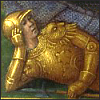You need to sign in or sign up before continuing.
Take a photo of a barcode or cover
My Lunches with Orson documented a series of taped interviews at a West Hollywood restaurant with Orson Welles and Henry Joglom at the last stage of Welles’s life. At first, I was appalled by Welles, an artist of stature, who resorted to gossip and put-downs of Hollywood stars to puff himself up. My opinion switched to that he had a sarcastic, wicked sense of humor. The magnitude of his talent and genius gave himself permission to think that he was superior. A turn-around occurred midway through the conversations. A bolt of insight jolted me out of an old stupor of formulated opinions of what I thought about the Golden Age of Hollywood. Welles the magician, filmmaker, actor and stage director either pulled a magic trick out of a hat or devised a kind of a heist that unwittingly obliterated the common consensus regarding the popularity of Hollywood, a dream machine of manufactured illusions. Welles’s caustic opinions provided the impression that it’s best to slash the silver screen of the past and step into a new realm regarding inventive storytelling, acting and directing. The conversations, impishly entertaining and ripsnorting shed Welles as dark as some of his best film noir.
I thoroughly enjoyed reading this. It brought back a lot of names, of people, events, & movies I grew up knowing but had somewhat forgotten.
It is sad, funny, and interesting.I couldn't put it down.
It is sad, funny, and interesting.I couldn't put it down.
Oh, Orson. Even at the end, even when talking to someone as annoying as Jaglom, even when the line between 'truth' and 'fiction' was more than usually blurred, you shone.
In all the mountains of Welles scholarship out there, has anybody written about what a sublime, erudite bullshitter Welles was? If not, Lunches With Orson provides steaming heaps of artifice. It's often a joy to read, though wearisome at times, as Welles can never quite drop the shtick of always performing, always eluding. Still, you get the sense he's having a blast, wandering about in this labyrinth of his own construction.
Simultaneously revealing, amusing, and fully illustrating why he was often getting in the way of his own success.
It's always interesting to read and hear Orson Welles' words and thoughts. While some of them are terrible, others are intriguing and thought-provoking. This record of his lunches with Henry Jaglom allow that briefest of glimpses into how his mind worked. It's a quick read that I will likely revisit in chunks when I'm looking for inspiration.
Overall I found this to be a very entertaining read. If anything it got me more interested in learning about Orson Welles and his journey in Hollywood.
If you ever wanted to hear Orson Welles gossip like a fifteen-year-old girl about Hollywood celebrities, you're in for a real treat.
If you liked "My Dinner with Andre" you'll love "My Lunches With Orson".
For years in the early eighties, filmmakers/actors Orson Welles and Henry Jaglom had lunch together at Ma Maisson, a Hollywood restaurant, where they were often interrupted by such folks as Richard Burton and Jack Lemmon. Welles, of course, was the fading auteur, at this point in his life trying to make a buck. Primarily he was trying to get deals to direct new projects he'd been working on, such as his film version of "King Lear". During the course of the book, a deal for Lear with the French seemed possible, and continually approached and receded as conditions changed and money seemed to materialize one day, disappear the next. Jaglom, with Welles' blessing, tape recorded these conversations, which is how this book was able to come into being.
Jaglom was and is a respected indie filmmaker who often acts in his own films. A generation or two younger than Welles, he had become Welles' friend, confidante, and agent, trying to put these deals together.
The tone of this book, even though the conversations came near the end of Welles' life, wasn't sour, but hopeful. Welles never really gave up on the idea that he had a lot of creative work ahead of him. Welles tells a lot of great Hollywood stories, makes a lot of outrageous pronouncements, and is always funny and opinionated. Jaglom plays along as the Boswell to Welles' Dr. Johnson, as in [bc:The Life of Samuel Johnson|688826|The Life of Samuel Johnson|James Boswell|http://d202m5krfqbpi5.cloudfront.net/books/1177242050s/688826.jpg|990842].
After reading this book, there are a lot of movies you're going to want to see, if only to reappraise them in light of Welles' and Jaglom's opinions, which sometimes vary greatly from the established critical party line.
Very enjoyable.
For years in the early eighties, filmmakers/actors Orson Welles and Henry Jaglom had lunch together at Ma Maisson, a Hollywood restaurant, where they were often interrupted by such folks as Richard Burton and Jack Lemmon. Welles, of course, was the fading auteur, at this point in his life trying to make a buck. Primarily he was trying to get deals to direct new projects he'd been working on, such as his film version of "King Lear". During the course of the book, a deal for Lear with the French seemed possible, and continually approached and receded as conditions changed and money seemed to materialize one day, disappear the next. Jaglom, with Welles' blessing, tape recorded these conversations, which is how this book was able to come into being.
Jaglom was and is a respected indie filmmaker who often acts in his own films. A generation or two younger than Welles, he had become Welles' friend, confidante, and agent, trying to put these deals together.
The tone of this book, even though the conversations came near the end of Welles' life, wasn't sour, but hopeful. Welles never really gave up on the idea that he had a lot of creative work ahead of him. Welles tells a lot of great Hollywood stories, makes a lot of outrageous pronouncements, and is always funny and opinionated. Jaglom plays along as the Boswell to Welles' Dr. Johnson, as in [bc:The Life of Samuel Johnson|688826|The Life of Samuel Johnson|James Boswell|http://d202m5krfqbpi5.cloudfront.net/books/1177242050s/688826.jpg|990842].
After reading this book, there are a lot of movies you're going to want to see, if only to reappraise them in light of Welles' and Jaglom's opinions, which sometimes vary greatly from the established critical party line.
Very enjoyable.
I've long been fascinated by Welles' career: intermittently meteoric and bathetic. I can't say I've read the other books of interviews with him (which might present a more complete picture of the man), but this volume, transcribed from informal lunchtime conversations with his friend the director/actor Henry Jaglom, shows Welles at the end of his life, a rueful and self-mythologizing oracle. It is not a flattering depiction; Welles comes across as generally resentful and bitter, as well as pathologically angry at certain people (most notably John Houseman and Irving Thalberg). His pronouncements veer at times into a weird racism, although I can't help but feel he was trying to get a rise out of Jaglom with a lot of that.
More than anything else, the Welles in this book is a man absolutely petrified with fear. I get the impression (from here and elsewehre) that this was a condition he suffered from most of his life. Having had such great artistic successes so early in his life, Welles (I feel) didn't know how to handle the drop-off later in his career, and so to forestall any other disappointments he stalled and intentionally screwed up most of his future opportunities to produce. This comes across vividly late in the book, when he's incredibly rude and dismissive of an HBO executive who seems (at least on paper) very interested in working with him on a miniseries. Still, he refuses to compromise on the tiniest point and drives her away with vehement negativity. Similarly, he seems to have been forever in negotiation to direct and act in a film version of King Lear (which would have been amazing) but never even began pre-production. Again, I can only interpret this as a deep-seated fear of failure. It's a fascinating (and slightly troubling) portrait of a man who decided it was easier to rail against the world.
More than anything else, the Welles in this book is a man absolutely petrified with fear. I get the impression (from here and elsewehre) that this was a condition he suffered from most of his life. Having had such great artistic successes so early in his life, Welles (I feel) didn't know how to handle the drop-off later in his career, and so to forestall any other disappointments he stalled and intentionally screwed up most of his future opportunities to produce. This comes across vividly late in the book, when he's incredibly rude and dismissive of an HBO executive who seems (at least on paper) very interested in working with him on a miniseries. Still, he refuses to compromise on the tiniest point and drives her away with vehement negativity. Similarly, he seems to have been forever in negotiation to direct and act in a film version of King Lear (which would have been amazing) but never even began pre-production. Again, I can only interpret this as a deep-seated fear of failure. It's a fascinating (and slightly troubling) portrait of a man who decided it was easier to rail against the world.





